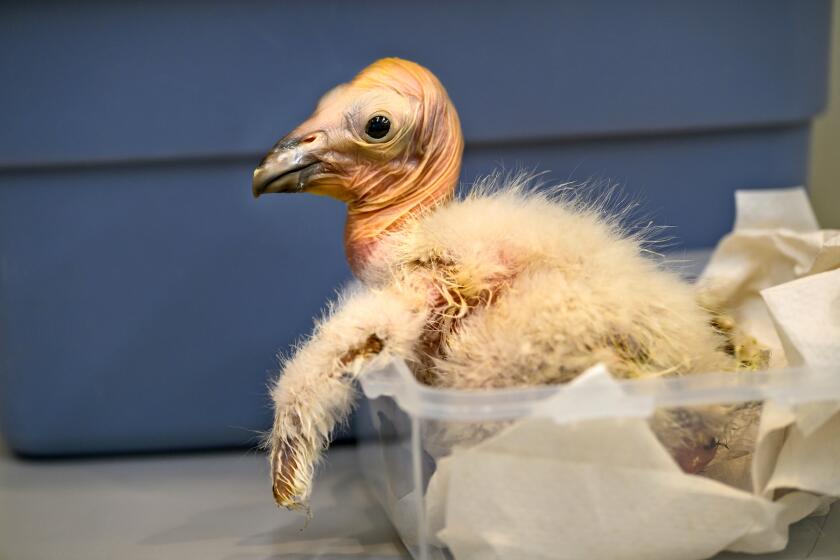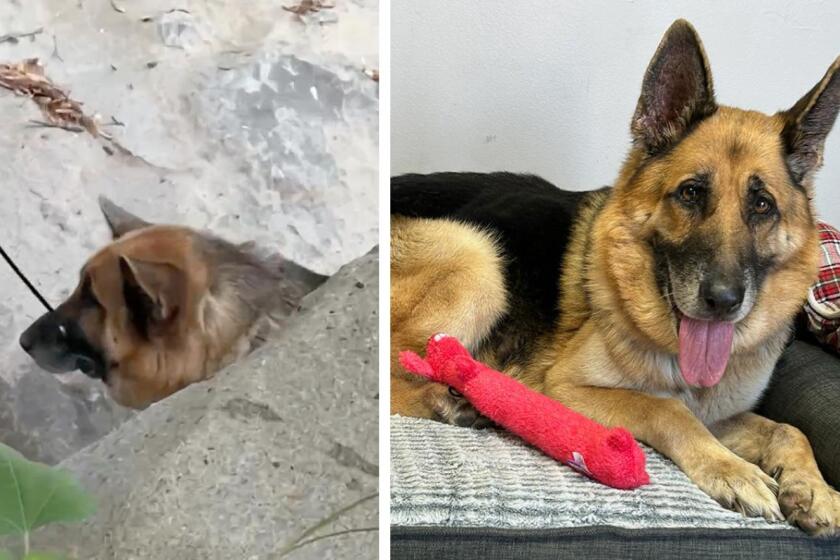New York Center Offers Counseling to Grieving Pet Owners : Mental health: People feeling guilt or anxiety over an animal facing surgery or death seek help. Many find such a loss emotionally devastating.
David and Marie Lane’s dog Poppi was 12 years old when she contracted the illness that led to her death. “When I found out she was going to die, my heart went into my shoes,” said Marie Lane. “Poppi was a part of us, she was one of the little people in our house.”
The week before Poppi died, the grief was overwhelming, Lane said. “I was going quietly frantic. Soon there would be no Poppi running to greet us at the door, screaming and jumping up and down when we got home.”
After Poppi died, the Lanes turned to the Animal Medical Center on Manhattan’s Upper East Side for help. The center houses the country’s first full-time counseling service for grieving pet owners.
Susan Cohen heads the center’s pet-loss program and talks to more than 25 owners a week about their anxiety, guilt or grief over a pet facing major surgery or final “sleep” by injection. She will spend up to four hours a day with a bereaved client and often follows up her counseling sessions with phone calls and return visits.
In 1982 the Animal Medical Center, the largest animal hospital in the country, founded a professional counseling program for grieving owners of critically ill and dying pets, which was considered quite innovative at the time. As a result of the program’s early success, Cohen started a pet-loss support group in 1983.
The hospital treats more than 70,000 animals a year, providing many of the same services offered by hospitals for humans: CAT scans, pacemakers, hip replacements, eye surgery and radiation therapy, among others. The counseling service is financed by the hospital, and is free to owners of pets treated there.
There are a whole host of reasons why people are emotionally devastated when their pet dies, Cohen said. The frustrations of city life, apartment dwelling and a profound sense of isolation among elderly owners can deepen the bond between humans and animals.
“Many people form very close attachments to animals,” Cohen said. “In many ways it is just like having a child, or a member of your family die or become seriously ill. It can be a very stressful, traumatic experience.”
The Lanes, who also have a 25-year-old daughter, said the center’s support group enabled them to communicate with others in the same predicament and to realize that they were not alone in their pain.
“My husband and I are lucky because we have each other,” Marie Lane said. “We talked about Poppi constantly and were able to go through the grieving process together. Some people are so stricken they just stop functioning,” she added, telling the story of one elderly support-group member who refused to leave her house for days after her miniature schnauzer died.
The program evolved from a 1981 national symposium on “Pet Loss and Human Emotion,” co-sponsored by the Animal Medical Center. Other veterinary hospitals across the United States followed suit; there are now counseling programs at University of Pennsylvania, Colorado State University and University of California, Davis.
A professionally trained social worker, Cohen heads a staff of social work and psychology students from six metropolitan-area universities who intern at the hospital and receive hands-on training in counseling pet owners.
She lectures at various veterinary schools and conferences on ways to understand the emotional ties that can develop between pets and owners. She also teaches veterinarians, social workers and veterinary technicians nationwide.
The most demanding and difficult part of her job, Cohen said, is helping people whose pets are seriously ill reach a decision on the kind of treatment they should pursue. Several factors must be considered in making a decision, including financial limitations and the quality of life envisioned for pets after surgery.
Larry Thornton is a former student-intern at the Animal Medical Center who has counseled individuals and families. Thornton said a recurring theme in group sessions was the unconditional love a pet is capable of and the tremendous sense of security many owners derive from knowing that their pet will never reject them.
He said that much of his time was spent talking with families who could not agree on whether to euthanize a pet cat or dog. “Often children and parents don’t agree on what is the best medical solution for their pet,” he said. “It is a very difficult process.”
In many instances the death of a pet highlights the other things that may be wrong with life--no children, the loss of a job or a recent divorce, Cohen said.
“To have to voluntarily agree to end the life of somebody you’ve loved for many years is a very difficult thing to do,” Cohen said. “For a lot of people it’s the same as deciding whether to turn off the respirator on Great Aunt Harriet, or even Dad. I’ve had many people say, usually with a lot of embarrassment, ‘I cried more for my dog than I did when my parents died.’ ”
More to Read
Sign up for Essential California
The most important California stories and recommendations in your inbox every morning.
You may occasionally receive promotional content from the Los Angeles Times.






